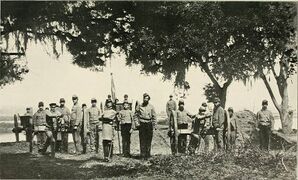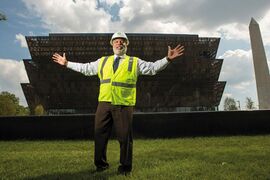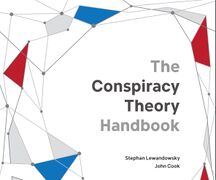News Gallery: Difference between revisions
| Line 24: | Line 24: | ||
[[File:Trump Russian asset.jpg |center|thumb| [https://slate.com/news-and-politics/2021/03/trump-russian-asset-election-intelligence-community-report.html?fbclid=IwAR0WKjIcoxhf9AXYJke2qhnpP3F4FvQtubzfzog55taQpAi1xVgHdVO1hV0 BY WILLIAM SALETAN MARCH 18, 2021 Slate]]] | [[File:Trump Russian asset.jpg |center|thumb| [https://slate.com/news-and-politics/2021/03/trump-russian-asset-election-intelligence-community-report.html?fbclid=IwAR0WKjIcoxhf9AXYJke2qhnpP3F4FvQtubzfzog55taQpAi1xVgHdVO1hV0 BY WILLIAM SALETAN MARCH 18, 2021 Slate]]] | ||
Donald Trump was a tool in a long-running Russian campaign to weaken the United States. That’s been documented in Republican-led investigative reports, and now it has been updated with new evidence, thanks to the U.S. Intelligence Community’s assessment of the 2020 election. The report, drafted by the CIA, the FBI, and several other agencies, was released in unclassified form on Tuesday, but it was presented in classified form on Jan. 7. In other words, it was compiled, written, and edited during Trump’s administration. It destroys his lies about the election, and it exposes him as a Russian asset. | Donald Trump was a tool in a long-running Russian campaign to weaken the United States. That’s been documented in Republican-led investigative reports, and now it has been updated with new evidence, thanks to the U.S. Intelligence Community’s assessment of the 2020 election. The report, drafted by the CIA, the FBI, and several other agencies, was released in unclassified form on Tuesday, but it was presented in classified form on Jan. 7. In other words, it was compiled, written, and edited during Trump’s administration. It destroys his lies about the election, and it exposes him as a Russian asset. | ||
|} | |||
{| | {| | ||
Revision as of 11:16, 13 March 2022
Tired of Superficial Facebook Interactions? Want to Post Durable Content Here??! ...How-To, On-Going Projects, Innovations, Fiction, Bios, Community Actions or anything with purpose; Write on my "Talk" page Talk:Kirk and we can Meet Remotely
Curated Web Exploring

A Refreshing Way to Browse the Web
TIP: Try entering an historical subject, for example: if you enter "Running Fence Christo" in "Balanced Journalism"
you will find many articles from the 1970's along with more recent material. Yes, they are Goggle
results but a lot of the noise is filtered out, allowing for more focused reading. (What no Fox News results?!!!)
Important and Overlooked Stories on the Web
A New Report Adds Evidence That Trump Was a Russian Asset
 Donald Trump was a tool in a long-running Russian campaign to weaken the United States. That’s been documented in Republican-led investigative reports, and now it has been updated with new evidence, thanks to the U.S. Intelligence Community’s assessment of the 2020 election. The report, drafted by the CIA, the FBI, and several other agencies, was released in unclassified form on Tuesday, but it was presented in classified form on Jan. 7. In other words, it was compiled, written, and edited during Trump’s administration. It destroys his lies about the election, and it exposes him as a Russian asset. |
Humans Are Doomed to Go Extinct
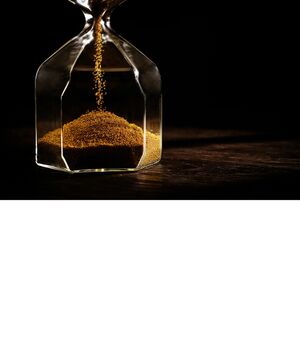 The most insidious threat to humankind is something called “extinction debt.” There comes a time in the progress of any species, even ones that seem to be thriving, when extinction will be inevitable, no matter what they might do to avert it. The cause of extinction is usually a delayed reaction to habitat loss. The species most at risk are those that dominate particular habitat patches at the expense of others, who tend to migrate elsewhere, and are therefore spread more thinly. Humans occupy more or less the whole planet, and with our sequestration of a large wedge of the productivity of this planetwide habitat patch, we are dominant within it. H. sapiens might therefore already be a dead species walking.
|
This is a fossil fuel war’: Ukraine’s top climate scientist speaks out
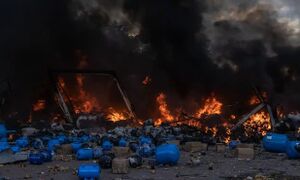 “Burning oil, gas and coal is causing warming and impacts we need to adapt to. And Russia sells these resources and uses the money to buy weapons. Other countries are dependent upon these fossil fuels, they don’t make themselves free of them. This is a fossil fuel war. It’s clear we cannot continue to live this way, it will destroy our civilization.” The IPCC report, described by António Guterres, the UN secretary general, as an “atlas of human suffering and a damning indictment of failed climate leadership”, is the most comprehensive catalogue yet of the consequences of global heating. Extreme heat and the spread of disease is killing people around the world, about 12 million people are being displaced by floods and droughts each year and the viability of food-producing land is shrinking. |
Half of US adults were exposed to harmful lead levels as kids, study finds
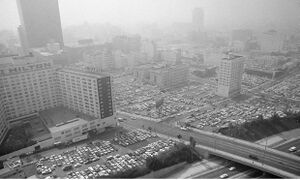 The scientists from Florida State University and Duke University also found that 90% of children born in the US between 1950 and 1981 had blood-lead levels higher than the CDC threshold. And the researchers found significant impact on cognitive development: on average, early childhood exposure to lead resulted in a 2.6-point drop in IQ.
|
Climate Change 2022: Impacts, Adaptation and Vulnerability
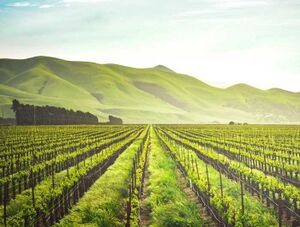 Climate change is affecting nature, people’s lives and infrastructure everywhere. Its dangerous and pervasive impacts are increasingly evident in every region of our world. These impacts are hindering efforts to meet basic human needs and they threaten sustainable development across the globe. All life on Earth – from ecosystems to human civilization – is vulnerable to a changing climate. Since the first IPCC reports, the evidence has become stronger: our world is warming and dangerous climate change and extreme events are increasingly impacting nature and people's lives everywhere. This can be seen in the depths of the ocean and at the top of the highest mountains; in rural areas as well as in cities. The extent and magnitude of climate change impacts are larger than estimated in previous assessments. They are causing severe and widespread disruption in nature and in society; reducing our ability to grow nutritious food or provide enough clean drinking water, thus affecting people's health and well-being and damaging livelihoods. In summary, the impacts of climate change are affecting billions of people in many different ways. |
Canada's trucker protesters aren't who Americans might think
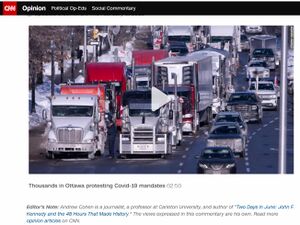 Carlson, Trump and Musk see something monumental here. They're wrong. Whatever the facile comparisons, familiar symbols and fearful words, this Canadian protest isn't a grassroots revolt or even a Prairie brushfire. More likely, it's a winter carnival, ephemeral, a flaring of anger -- and one that is very, very Canadian. |
The US senate presents a long-term threat to US democracy
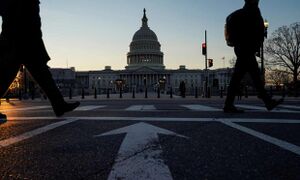 The filibuster has consistently been an instrument of white Christian domination: during the 20th century, it was used predominantly to block civil rights legislation and measures such as anti-lynching bills. However .... Let’s be specific about how undemocratic an institution this is – something that is best captured in numbers: in the current 50:50 Senate, Democratic senators represent 40 million more voters; by about 2040, 70% of the country will be represented by just 30 senators, while less than one-third of the electorate will get to determine 70 out of 100 members of the Senate. |
Carter warns America 'teeters on the brink of a widening abyss' in stark op-ed ahead of January 6
 "I now fear that what we have fought so hard to achieve globally -- the right to free, fair elections, unhindered by strongman politicians who seek nothing more than to grow their own power -- has become dangerously fragile at home," said Carter, who in his post-presidency started the Carter Center, a nonprofit that monitors free elections around the globe. |
It's Past Time For Democrats To Defy the Supreme Court
 The year 1981 was a big one for court-stripping—or, as it’s sometimes called, jurisdiction-stripping. No fewer than 30 pieces of legislation were introduced that year into the US House of Representatives by Republican congressmen that included court-stripping provisions. It was a huge topic of discussion and legal activity among Republicans. And a young lawyer working in Ronald Reagan’s Justice Department, an up-and-comer named John Roberts, was hot on the trail. … |
‘We will all die’: In Kenya, prolonged drought takes heavy toll
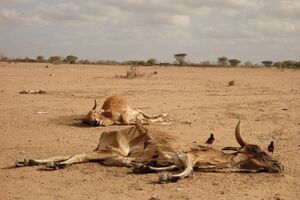 Since September, much of Kenya’s north has received less than 30 percent of normal rainfall – the worst short-rain season recorded in decades, according to the Famine Early Warning Systems Network. The lack of rainfall has wiped out pastures and exacerbated food and water shortages. It wasn’t always like this. While residents such as Adow are used to lean times when faced with the effects of droughts – when maize becomes their only meal, the distance to find water extends, their animals become so weak their bones poke from underneath their skin – they are also accustomed to the eventual return of rainfall and, along with it, greener pastures, healthier animals and fewer financial troubles.
|
The 2021 Made in America Holiday Gift Guide
 By shopping Made in America this holiday season, you can help strengthen American manufacturing and support good factory jobs. But best of all, these American-made gift ideas are just really cool! We think there’s something for everyone on your list, but if you still can’t find what you’re looking for, check out our Made in America Directory or previous gift guides, which are linked below. And don’t forget to share the gift guide with family and friends, and on social media using the hashtag #MadeinUSAGifts. |
I was wrongly convicted and sentenced to death. We need to do more to help exonerees.
 There are nearly 2,900 exonerees in the United States. Many are the lucky ones who had DNA available in their case. I lost 17 years of my life, but I’ve lost more than just hours and days. I lost an innocent man who was my husband; I missed birthdays and moments that can never be replicated. My life is dedicated to helping others who have faced wrongful incarceration.
|
Why the WHO approval of the first malaria vaccine is a big deal
 But progress is happening. On Wednesday, the World Health Organization (WHO) announced it has given its stamp of approval to a vaccine against malaria for children for the first time, after encouraging results from a pilot study that has reached hundreds of thousands of children across parts of sub-Saharan Africa since 2019. The vaccine, called Mosquirix and made by GlaxoSmithKline, is far from perfect — it produces about a 30 percent reduction in severe malaria in fully vaccinated children, which is lifesaving but smaller than would be hoped for.
|
U.S. retail operations got lean by making CEOs fat, and now everyone is paying the price
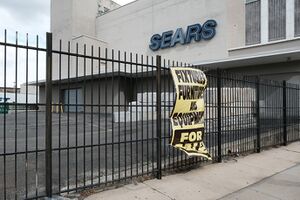 For an on-the-ground example, see Costco. Throughout the pandemic, even as photographers snapped shots of the empty racks at other retailers, Costco has done a phenomenal job of keeping its stores operating not just as well as they did before the pandemic, but better. Same store sales are up 16% in the last year, and Costco managed this while at the same time increasing their own online sales by 44%. It’s done that, in part, by keeping employee turnover at a minimum, which comes from years of paying its employees well, offering them benefits, and respecting their health concerns during the pandemic. If “lean” companies are now finding themselves unable to keep the shelves stocked, Costco is fat and happy. |
The Most Detailed Map of Cancer-Causing Industrial Air Pollution in the U.S.
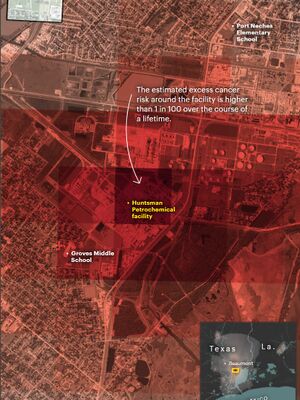 It’s not a secret that industrial facilities emit hazardous air pollution. A new ProPublica analysis shows for the first time just how much toxic air pollution they emit — and how much the chemicals they unleash could be elevating cancer risk in their communities. ProPublica’s analysis of five years of modeled EPA data identified more than 1,000 toxic hot spots across the country and found that an estimated 250,000 people living in them may be exposed to levels of excess cancer risk that the EPA deems unacceptable. |
Beware: Gaia may destroy humans before we destroy the Earth
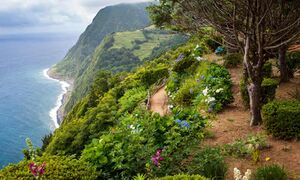 This division is as much of a mistake as the error made by universities when they teach chemistry in a different class from biology and physics. It is impossible to understand these subjects in isolation because they are interconnected. The same is true of living organisms that greatly influence the global environment. The composition of the Earth’s atmosphere and the temperature of the surface is actively maintained and regulated by the biosphere, by life, by what the ancient Greeks used to call Gaia.
|
Earth is already becoming unlivable. Will governments act to stop this disaster from getting worse?
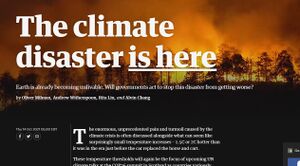 These temperature thresholds will again be the focus of upcoming UN climate talks at the COP26 summit in Scotland as countries variously dawdle or scramble to avert climate catastrophe. But the single digit numbers obscure huge ramifications at stake. “We have built a civilization based on a world that doesn’t exist anymore,” as Katharine Hayhoe, a climate scientist at Texas Tech University, puts it. |
How natural disasters benefit rich people but make the poor poorer – an illustrated story
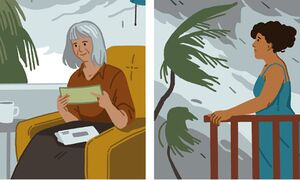 |
Pandora papers: biggest ever leak of offshore data exposes financial secrets of rich and powerful
 Branded the Pandora papers, the cache includes 11.9m files from companies hired by wealthy clients to create offshore structures and trusts in tax havens such as Panama, Dubai, Monaco, Switzerland and the Cayman Islands. They expose the secret offshore affairs of 35 world leaders, including current and former presidents, prime ministers and heads of state. They also shine a light on the secret finances of more than 300 other public officials such as government ministers, judges, mayors and military generals in more than 90 countries.
|
The myths about slavery that still hold America captive
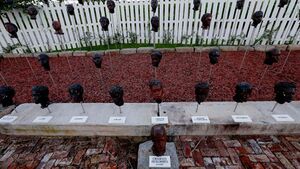 The idea that an institution that existed for 250 years and has only not existed for a little over 150 years. An institution in which there are people who are alive today who were loved, raised by, and in community with people born into chattel slavery. The idea that that would have nothing to do with what the contemporary landscape of inequality looks like today is morally and intellectually disingenuous. |
America faces supply-chain disruption and shortages. Here’s why
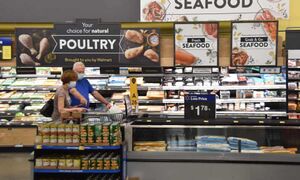 The specific policies that led to our supply constrained world are lax antitrust, deregulation of basic infrastructure industries like shipping, railroads and trucking, disinvestment in domestic production, and trade policy emphasizing finance over manufacturing......Take biopharmaceutical equipment necessary to make vaccines. There’s a shortage of fancy plastic bags that you mix chemicals in to make medicine, which isn’t surprising in a pandemic. But the reason for the shortage isn’t just Covid but a merger wave; over the last 15 years, four firms bought up the biopharmaceutical equipment industry, without any antitrust agency taking meaningful action. These firms now have market power, and dominate their competitors, by ensuring their bags can only interoperate with their specific mixing machines. It’s like not having enough Keurig coffee machine pods; the shortage isn’t the coffee, it’s the artificial bottleneck used to lock in customers.......Ocean shipping is the same. The 1997 Ocean Shipping Reform Act legalized secret rebates and led to a merger wave. The entire industry has now consolidated globally into three giant alliances that occasionally crash their too-big-to-sail ships into the side of the Suez canal. |
Ranked-choice voting is the best fix for our democratic crisis
“A complicated, complex field simplified with a simple trip to the ballot box, at a fraction of the cost of a full-fledged runoff" 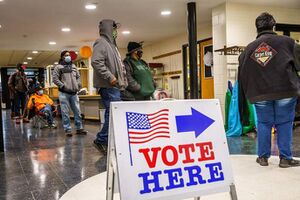 |
Bitcoin miners align with fossil fuel firms, alarming environmentalists

|
Flying Microchips The Size Of A Sand Grain Could Be Used For Population Surveillance'
 |
How Trump with Pence's Help Planned to Overthrow the Election

|
‘Havana syndrome ’ and the mystery of the microwaves
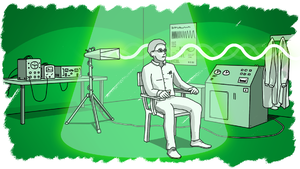 |
Adding Rock Dust to Soil Can Capture Carbon
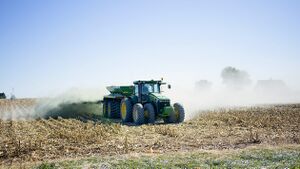 |
Economists' erroneous estimates of damages from climate change
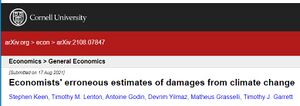 |
U.S. boarding schools for Indians had a hidden agenda: Stealing land’
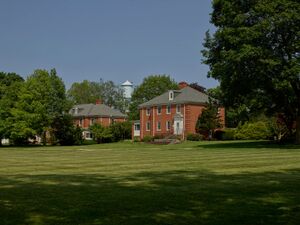 |
Forget the Alamo: The Rise and Fall of an American Myth’
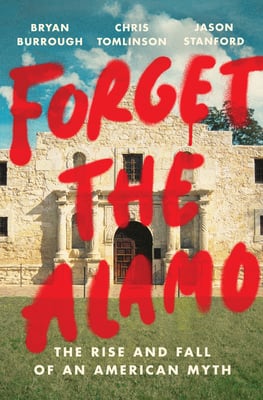 |
Too hot to work: the dire impact of extreme heat on outdoor US jobs’
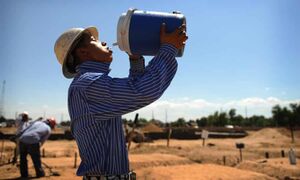 |
IPCC climate report: Earth is warmer than it’s been in 125,000 years’
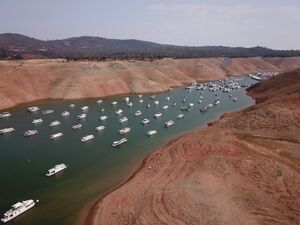 |
Toyota is quietly pushing Congress to slow the shift to electric vehicles’
 |
The Seas Are Rising. Could Oysters Help?’
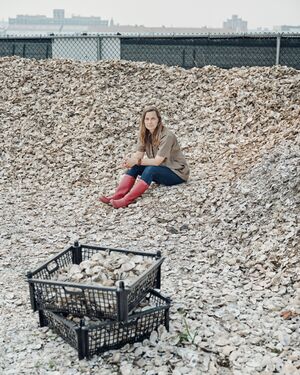
|
It could feed the world’: amaranth, a health trend 8,000 years old that survived colonization’
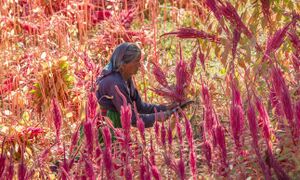 |
Americas Bolivia's lake Poopo dries up and scientists fear refill unlikely’
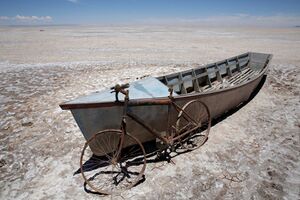 |
Environmental impact of bottled water ‘up to 3,500 times greater than tap water’
 |
For Billion-Dollar COVID Vaccines, Basic Government-Funded Science Laid the Groundwork
 |
Why are so many babies dying of Covid-19 in Brazil?
 |
How the Supreme Court laid the path for Georgia's new election law
 |
From Crisis to Reform: A Call to Strengthen America’s Battered Democracy
 |
New stars on the American flag? Fresh hope as Puerto Rico and DC push for statehood
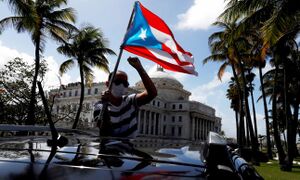 |
Two of India’s richest men face farmers’ ire over new laws Two of India’s richest men have landed in an unlikely controversy over farming laws, becoming targets of protesters who allege the tycoons have benefited from their close links to Prime Minister Narendra Modi. The new farm legislation, passed in September, will allow private companies to buy produce directly from farmers, moving from the decades-old system of state-run wholesale buyers and markets that guaranteed a minimum support price. India’s top court last week barred the implementation of the law until the court decides on the matter. |
Underestimating the Challenges of Avoiding a Ghastly Future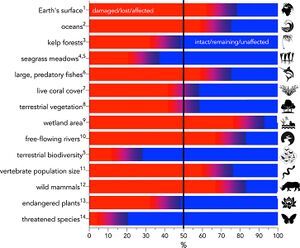 Major changes in the biosphere are directly linked to the growth of human systems (summarized in Figure 1). While the rapid loss of species and populations differs regionally in intensity (Ceballos et al., 2015, 2017, 2020; Díaz et al., 2019), and most species have not been adequately assessed for extinction risk (Webb and Mindel, 2015), certain global trends are obvious. Since the start of agriculture around 11,000 years ago, the biomass of terrestrial vegetation has been halved (Erb et al., 2018), with a corresponding loss of >20% of its original biodiversity (Díaz et al., 2019), together denoting that >70% of the Earth's land surface has been altered by Homo sapiens (IPBES, 2019). There have been >700 documented vertebrate (Díaz et al., 2019) and ~600 plant (Humphreys et al., 2019) species extinctions over the past 500 years, with many more species clearly having gone extinct unrecorded (Tedesco et al., 2014). Population sizes of vertebrate species that have been monitored across years have declined by an average of 68% over the last five decades (WWF, 2020), with certain population clusters in extreme decline (Leung et al., 2020), thus presaging the imminent extinction of their species |
Bellingcat breaks stories that newsrooms envy — using methods newsrooms avoid
 The investigative collaborative — which relies on both paid and volunteer researchers combing through “open-source” digital data available to anyone with the right searching skills — has been responsible for several eye-popping scoops: pinning the crash of a Malaysian airliner in Ukraine to a Russian missile, unmasking spies supposedly behind the poisoning of a Russian double agent in England and dissecting the racist motives of the Christchurch, New Zealand, mosque mass shooter. |
Vote in Poll
Good Long Reads
<paypal></paypal>
Model Layout (Edit Source)
|Headline’
center|thumb| [Url Byline] Fair Use Quote from article
Pertinent Topics- Racism, Climate Change, electoral process, information access, free speech, income inequality
